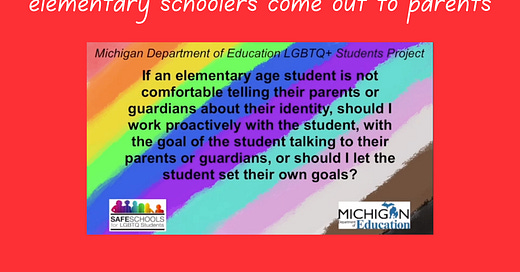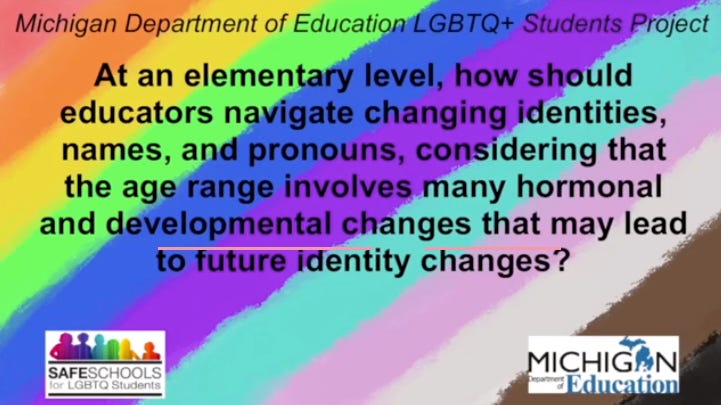Michigan Department of Education trains teachers how to help elementary school students come out to parents
They also encourage teachers to not inform parents when students change their name/pronouns.
I’m creating the most unique unwoke content on the internet, and I’m completely funded by you! This month, I’d like to earn the support of 75 new paying subscribers. That will allow me to spend as much time as possible bringing you stories like this that you won’t find anywhere else. We’re 22% of the way there so far:
If you appreciate my work, please consider a $5/month or $50/year subscription.
If you can’t financially support my efforts, please consider sharing my work with your friends and family to spread the message. I can’t do it without you.
Creating a Gender Support Plan.
Last year, the Michigan Department of Education trained teachers on how to help elementary school students come out to parents.
Welcome to the third of my series of articles exposing the LGBTQ+ Students Project teacher training sponsored by the Michigan Department of Education.
In the first article in this series, I broke down how the Michigan Department of Education is training teachers to be groomers.
In the second article, we watched as trainer Kim Phillips-Knope told teachers they have no obligation to inform parents if a student goes by a different name and pronouns than their legal ones.
In the latest training we watched, they are doubling down.
They literally trained teachers on how to create a coming out plan to help students tell their families they were LGBTQ+. And that plan will likely exist in the student’s file at school.
Let’s all give the taxpayers of Michigan a big hand for paying for all of this.
Here is the question that was asked.
Here’s how Clinical Psychologist Dr. Amorie Robinson (also known by her African name Dr. Kofi Afua Adoma) and Project Lead Kim Phillips-Knope answered:
It depends on the situation and the child.
Let the student guide it but check in regularly.
Use the resources from Gender Spectrum to create a Gender Plan for the student in school that would include if they wanted to come out and how they wanted to do it.
The Gender Plan is already used with kids at the high school level in Michigan, but the trainers feel confident that it’s totally fine to use with younger students too.
We’ll look at that Gender Plan in a minute. First, watch the video for yourself:
The Gender Spectrum Gender Support Plan is a 6 page document that a teacher would fill out working with the student (without telling their parents, obviously). This form will go into your child’s school file for reference.
One of the very first questions asked is what parental involvement is, with the introductory paragraph noting that caregivers should only be involved in creating the plan if it’s appropriate:
Download a copy of the Gender Support Plan here as it appeared on Gender Spectrum’s website, last updated in October 2022 (which was after this training so, admittedly, it could be different):
But that’s not all!
That’s not the only crazy thing in this training.
About half way through the training, Kim asks those participating if they believed they needed to inform the parents if a student changes their name and pronouns.
Overwhelmingly, the teachers voted that they DO NOT believe they need to inform parents if students change their name and pronouns.
Elementary and middle school counselor Carla Westerby said that it should be mandatory for school personnel to use whatever name and pronouns transgender students want, even if their parents disagree.
Kim: I just want to take a moment to invite if there's anybody who wants to speak about why they chose to place themselves where they did on the scale?
Carla: I shared I strongly agree I actually feel like “should” should be the word “must” because our students have the right to feel safe however or whoever they are in our schools and we should absolutely be honoring whoever or however it is that they want to be addressed. And in this case, specifically pronouns, yes if someone wants to go buy she/they or he/they or whatever their pronouns are then we need to honor that regardless of what parents think.
Now I do need some education in this area because we are dealing with some unique situations. I used to be a high school counselor for 10 years before I moved to an elementary middle school setting and so there's some things that we are running into push back for lack of better words from staff and I feel like I need to speak on behalf of my students and so I'm feeling very passionately and strong about this but I also need help that's probably later down the road or in another workshop.
What happened after that poll will shock you.
Are schools or teachers liable if they withhold information about a student’s chosen name and pronouns from that student’s parents?
When asked if teachers could be held legally liable if they withhold information about a student’s chosen name and pronouns from that student’s parents, she asked the following:
She gets asked this in almost every training she does.
There’s nothing legally that prevents the school from going by the name and pronouns a student wants, regardless of the age of the student.
Best practice is to go by the name/pronouns a student wants to go by, regardless of if parents are informed.
The state Board of Education guidance supports this, and says only to inform parents on a case-by-case basis because parents might not be safe.
Teachers may cause unintentional harm by telling a parent.
Most schools don’t actually have a policy that say they have to use a student’s name/pronouns or contact the parents.
Title IX supports teachers using the name/pronouns the student wants, and the legal team for the Michigan Department of Education agrees.
When a teacher says their district requires parental permission, Kim slaps that idea down and tells them no, their district is not required to do that and she shouldn’t think a permission slip should be required because it could harm the student.
After that, Jenny Murphy (who works at the University of Michigan Medical School with students to “teach them how to be good doctors”) adds to Kim’s answer by saying that if a school was sued for this, caselaw favors the student:
“Sometimes schools are trying to protect their youth and so they think they need to do what parents are wishing, but there's a lot of case law now that shows that if things were to go to court, cases are decided in favor of students not what their parents wanted.
Schools could be trying to be inclusive of parents but sometimes when we overly defer to what the parents wishes that's not what we see in case law.”
How is liability affected if a student dies by suicide and parents did not know the student’s chosen name or pronouns were being used at school?
When Kim was asked how is liability affected if a student dies by suicide and parents did not know the student’s chosen name or pronouns were being used at school, she answered that you can talk to parents about their kid having suicidal thoughts without telling the parents they are using different names and pronouns.
“If you're sort of into that area of ‘you're gonna hurt yourself or somebody else’ and you have a duty to report, the law is really clear about that. You can also talk to parents, though, about ‘your kid is having suicidal thoughts’ without outing them without saying why”
At the elementary level, how should educators navigate changing identities and pronouns considering the age range involved?
When asked how they should guide changing identities and pronouns at the elementary school level, the trainers answered:
Gender fluidity is a normal process, their identity will shift over time.
They should celebrate coming out day and gay history month in school to educate parents and the community about gender expression in middle school and elementary school.
Remind your staff that it’s developmentally appropriate to discuss gender expression starting in 4th grade because that’s the time they develop sexuality and sexual orientation.
Adults are uncomfortable because they need things to be stable, and that’s why they might have an issue with gender fluidity.
They can connect educators with counseling staff in Michigan to help them.
Tik Tok Training
A highlight of this training (and all the ones in the series we’ve watched so far) was the use of Tik Tok to give educators the chance to listen to the voices of young people and allies. Here was my favorite:
There was one bright spot in the training.
When the initial poll was conducted asking if a student’s preferred name and pronouns should be used regardless of what the parents want, a counselor spoke up and said she disagreed with using the students preferred name and pronouns because she’s seeing more and more of these cases and it seems that students change their pronouns every week. She said that student safety means being able to identify students by their legal name while they are legally minors:
There is still sanity in the world.
You can watch my full stream watching this training here:
What do you think?
Do you think it’s appropriate for teachers to create a coming out plan for children in elementary school?
Leave a comment and let me know! And please share this with your friends and family who need to learn this information.
Fight back against the woke and support my work.
I believe the woke - on the left and the right - are an existential threat to our values as Americans. Some of them know it, most of them are just useful innocents. Regardless, fighting back against this woke cultural revolution is my full-time job. I’m dedicated to exposing the woke ideology in our country, helping people to understand what’s going on, and providing spaces for non-woke people to connect, support each other, and plan ways to fight back.
Here’s how you can help.












This was a great stream. My favourite part was the TikTok Training. (My eyes popped a bit when Jenny Murphy stated that most court cases favour the students over the parents.)